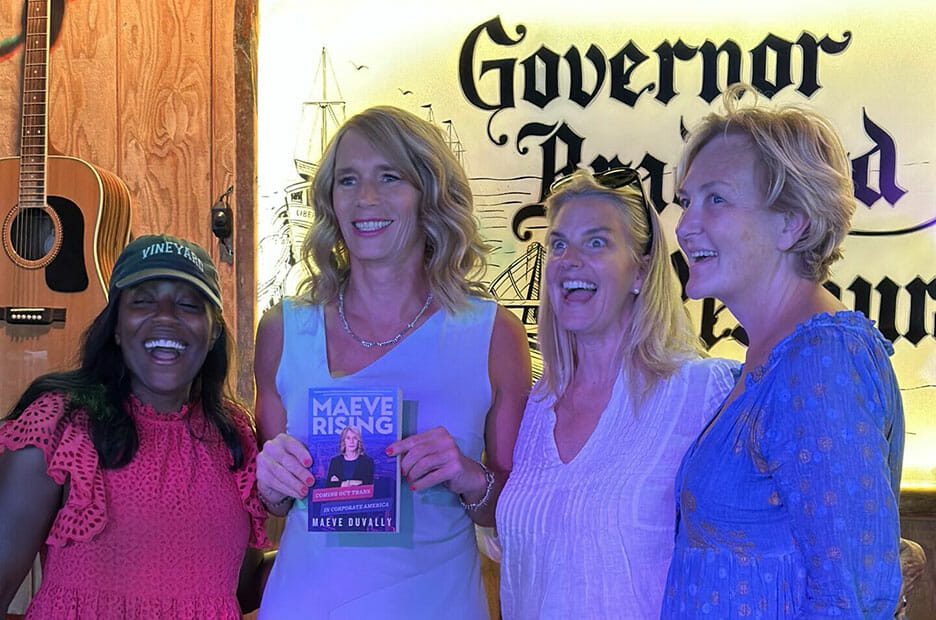Maeve Duvally weaves a compelling narrative of international sexual and cultural awakenings against a backdrop of alcohol abuse, family drama and her journey of self-discovery.

On a sunny summer morning, Maeve Chevonne DuVally is taking in the rays on a patio in Provincetown while recalling the darkest days of her life. Fortunately for her, those terrible times are behind her, attached to a past that she has mostly discarded, except to share the stories of how she survived being an alcoholic, a habitually failed partner and absent parent.
“I was in a dark place,” DuVally tells GLAAD. “I didn’t know how to get out. I was afraid of everything, and I was all alone. That was my life for many, many years. So, this, compared to that, especially today when I’m sitting outside and I’m looking at the ocean? This is nirvana.”
The former Goldman Sachs communications executive tells these stories in her powerful new memoir, Maeve Rising: Coming Out Trans in Corporate America, just published by Siblylline Press.
“This is Maeve DuVally’s heartbreaking, brave and triumphant story of coming out as a transgender person not just in corporate America, but on Wall Street, and not just on Wall Street, but at Goldman Sachs,” says author Bethany McLean about Maeve Rising. “It would be important reading at any timem, but in the times in which we live, it’s essential.”
“Compelling and personal,” is how GLAAD President & CEO Sarah Kate Ellis describes the memoir. “DuVally shows that discovering our true selves is a fundamental part of human nature.”

DuVally’s struggles with depression, drinking and lifelong despair put her on a path toward suicide, and left a trail of broken bottles and broken hearts that included those of her own children. Although she had reached a career pinnacle on Wall Street, she did so while facing a felony charge that starkly revealed how she had drowned her judgment in a spiral of liquor, triggering loss after loss.
It is ultimately through rehab that Duvally finally found her way, not only discovering her authentic self but also her new passion for advocacy and to live in support of those who never stopped loving and supporting her.
“After I got sober in the January of 2018, and started taking recovery seriously” DuVally writes, “my life got big, fast. It was as if Michael had died that day in my apartment so that Maeve could live and thrive.”
DuVally’s story was first told by Emily Flitter in The New York Times in 2019, two months after they met at a function in which Goldman Sachs hosted journalists for a happy hour. Still in her male presentation, DuVally whipped out a wallet at the bar that was pink and identical to Flitter’s own. Ever curious, The Times reporter struck up a conversation, which prompted a panicked DuVally to steer her into a quiet corner, as she tells in her memoir. DuVally’s coming out story followed in June.
Although both Flitter and DuVally both rely on outdated terms like “women’s clothing” to describe the wardrobe she started to embrace as her own, both The Times account and Maeve Rising paint an ultimately positive journey for the Manhattanite, showing her overcoming obstacles spanning the globe, from her native Cork, Ireland, to many trips to Japan, as her true self.
What does the future hold for DuVally? Since leaving Goldman Sachs, she’s forged a new career as a communications strategy consultant for corporations and other groups, focusing on diversity, equity, inclusion and LGBTQ+ workplace issues.
And she’s on the lookout for love.
“It’s not easy for a 62-year-old trans lesbian to date,” DuVally confesses. “It’s not easy at all. However, since I’ve come out, I’ve had two relationships. They’ve been great. They just haven’t lasted. So, as much as I want to tell myself that I’ll never find another person again, the evidence does not bear that out. And I’m hopeful I will!”
Maeve Rising: Coming Out Trans in Corporate America, is available at Siblylline Press, Amazon, Barnes & Noble and other booksellers. Find out more and contact Maeve Duvally at maeveduvally.com













